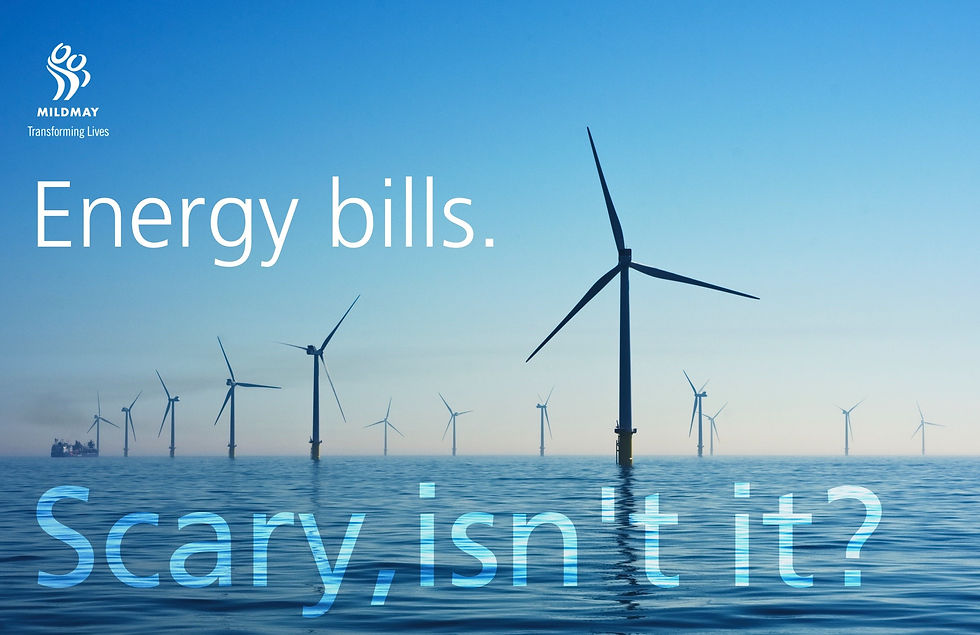Mildmay is hit hard by the energy crisis as our electricity costs triple!
- Jul 13, 2022
- 3 min read

At the end of July, Mildmay will reach the end of our fixed-price contract for electricity.
Yesterday, our Chief Executive, Geoff Coleman, reluctantly signed a new fixed-price energy contract for the next three years which will see the cost of our electricity more than treble. This was the best deal that we could get - some of those on offer were almost four times our existing contract!
To put this into context, in the last twelve months, our electricity cost us just over £50,000. In the next twelve months, if it were an identical year, the bill will be about £160,000. We are doing everything that we can to reduce our energy consumption, but as we occupy a relatively new, efficient and well-insulated building, we already use low-energy bulbs and equipment throughout and urge our staff to be aware of saving energy wherever they can. But, as a hospital that operates 24/7, we are very limited in additional steps we can take to reduce our energy consumption.
A bigger picture
This crisis is impacting everyone in the UK, if not worldwide, and is compounded by the dramatically rising cost of living, post-pandemic and Brexit-related causes, and of course the war in Ukraine. This all means that our other costs, such as food for our patients, are also rising. With half of the British public expecting their finances to get worse in the coming months, it’s understandably difficult to stay optimistic about the impact it will have on the charity sector.
The dire situation that confronts us all has led to us losing a few regular donors, some of whom have supported us for many years but are finding that they can no longer do so, as their circumstances are also becoming more difficult, which is terribly sad. We have also seen a downturn in donations through our website, and a reduction in support from trusts and foundations and church and community groups.
And we are not alone. 1.6million fewer people gave to charities in 2021 than in 2020. Alongside concerns about reduced donations, increased prices and staff retention, the value of monies charities do possess has also gone down in value.
58% of charity leaders said that generating income and finding financial stability was one of their three top challenges
86% of charitable organisations are worrying about the effect that cost of living increases will have on those that depend on their services
71% of charities expressed concern over managing increased demand for their services
59% are concerned that people will not continue to or begin to donate to their cause because of the cost of living crisis
Over 80% of charities expect to struggle with the increased cost of utilities for their own venues, as well as managing wage increases
Two-thirds of charity chief executives are worried about higher prices of stock, supplies and equipment
Overall, 35% believe their organisation will struggle to survive altogether
Regular polling of the public in March 2022 showed that 14% of people plan to cut back on charity donations in the coming year.
What can be done?
The Charities Aid Foundation recommends that donors who want to continue supporting charities or make the most of their charitable donation should:
Always include gift aid which increases the value of every pound by 25% for the charity
Talk to your employers about a payroll giving scheme where employees can donate to any registered UK charity straight from their salary pre-tax, meaning the charity will receive more and it costs the donor less
Donate clothes, furniture, books and any other household items as you can to support charities. These goods can be sold in charity shops or go directly to people in need. Add gift aid here too to make the most of every donation.
Volunteering has never been more important to charities. They have always been an essential part of the third sector, but if people are able to offer their time and skills, it’s a solid way to give practical help
Campaigning with a local action group is also an honourable way to support charities and people in need. Anything from leaflet dropping to writing to your MP or raising awareness in your community helps.
We are so grateful to our supporters and the donations they make, which make a difference both here in the UK and also to the thousands of people whose lives we touch in Kenya and Uganda.
We sincerely hope that you also manage to navigate through the difficult times ahead and that you can keep supporting Mildmay too.
Can you donate to Mildmay today?
Some information was taken from this article on charitylink.net
Image credit: Nicholas Doherty
(Rampion Offshore Wind Farm, United Kingdom)











コメント